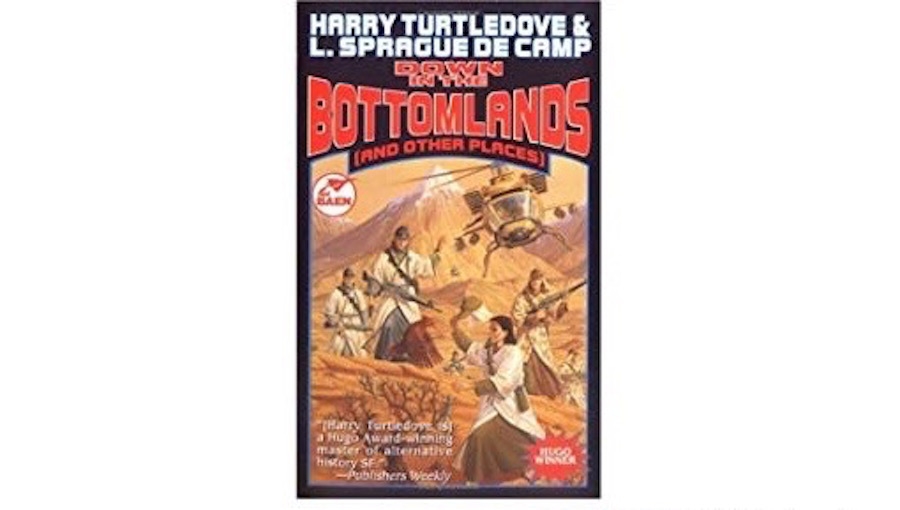The following is an interview with Hugo Award-winning author Harry Turtledove, known for his work on Down in the Bottomlands, How Few Remain, and The Gladiator. In this interview, Fanbase Press Contributor Madeleine Holly-Rosing chats with Turtledove about the inspiration behind his novels, his creative process and approach to writing, and more!
Madeleine Holly-Rosing, Fanbase Press Contributor: Thank you for taking the time to do this. I really appreciate it. What does your typical work day look like?
Harry Turtledove: I try to write some most days. I used to be much more rigid about writing every day than I am now; I must be getting old or something. When I have enough manuscript accumulated for one project or another, I transcribe it to typescript and clean it up while doing so. I read things, which is where a lot of ideas come from. I try to be a decent husband and not too useless around the house. I mess with the cats’ minds. That kind of stuff.
MHR: What themes do you like to write about the most?
HT: Whatever interests me at the moment.
MHR: Before this interview, I went back and re-read Agent of Byzantium, a very fun and well-written book. I noticed it is written as a connected series of short stories focusing on one character. You did the same type of structure for your short stories in the anthology, Some Time Later. Yet, some of your other novels are structured differently. How do you decide what structure you are going to use for a project?
HT: Thank you. I wrote the stories for AGENT OF BYZANTIUM as stories; each was intended to stand alone and sold as a standalone. The same applies to the stories that went into A DIFFERENT FLESH. The only thing better than getting paid for your work is getting paid more than once. but novels as novels are bigger than stories and have more going on. That’s the point to them, if there is such a thing.
MHR: You’ve written fantasy as well (Videssos Cycle, The Darkness Series). Do you plan on writing more in that genre?
HT: I’ve written alternate history, regular sf, fantasy (much of it historically based), historical fiction, and even the occasional mainstream piece. I just sold a fantasy novelette a couple of months ago and went over the page proofs yesterday. I’m kind of noddling with the possibiitity of trying a historical mystery right now. You do what your life and your knowledge and your interests lead you to do, that’s all.
MHR: Having a Ph.D in Byzantine history, you clearly have a fascination for that subject. But is there another place and time in history that you have a passion for and why? Would you be willing to time travel to that time period if it were possible?
HT: I’m not time-traveling to anywhere they don’t have anesthesia, antibiotics, and indoor plumbing. Most modern people have no idea how nasty life was only a couple of hundred years ago even for the richest people in the world.
MHR: Your latest novel, Through Darkest Europe, will be released in September 2018 and it centers on a free and democratic Middle East threatened by an extremist and despotic Europe. I find this premise particularly interesting, as I have an MA in Arabic and the Cultural History of the Arabs. Knowing that the Middle East was once the heart of scientific learning and culture, is that why you decided to flip the march of history and see where it took you? Or was there another reason you wanted to write this book?
HT: One of the things science fiction does particularly well is role reversal. Steve Barnes’ LION’S BLOOD and its sequels are a good example of that. So, I thought I’d have a go at it, looking at some of the things going on in the world through the odd kind of funhouse mirror only alternate history can give.
MHR: What’s coming up after Through Darkness Europe?
HT: I just got the copyedited manuscript for a contemporary supernatural thriller called ALPHA AND OMEGA, which will come out next year from Del Rey.
MHR: We met at the steampunk convention Clockwork Alchemy in San Jose. How do you like working at cons? How many do you do a year? And, is there any advice you’d give to the newbie and the more experienced exhibitor on how to hawk their books and survive a con?
HT: I do four or five cons a year. They’re fun for me, in moderation. Some folks are energized and pumped up by being around other people all the time. I’m not. I get drained instead. Anyone would think I was a writer or something, not a politician or an actor. So, more than that would likely be more than I could handle.
MHR: Last but not least, what is your favorite dinosaur and why?
HT: The goose, I think. It’s particularly delicious.

